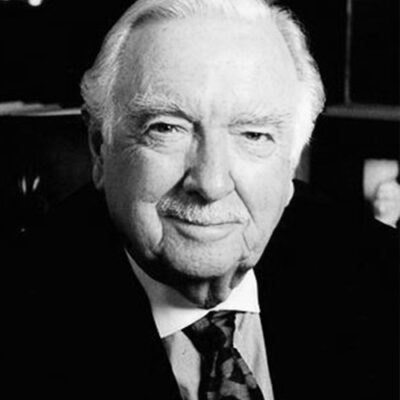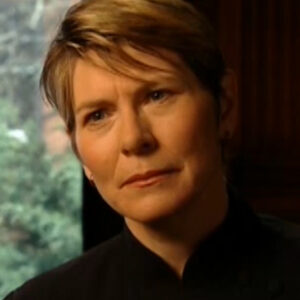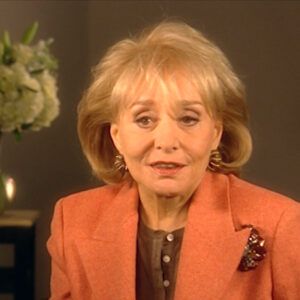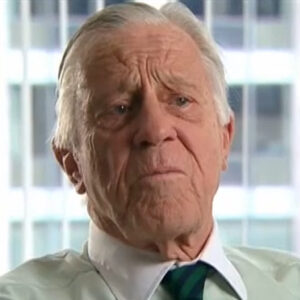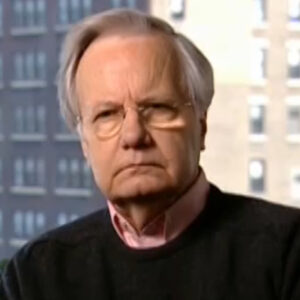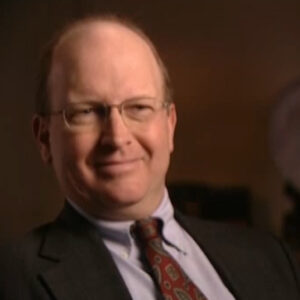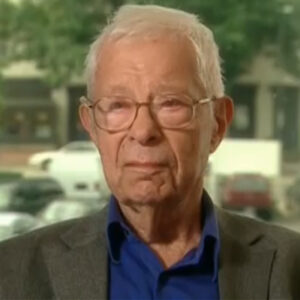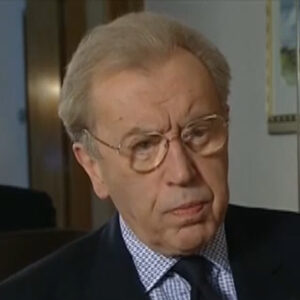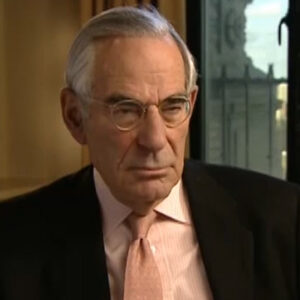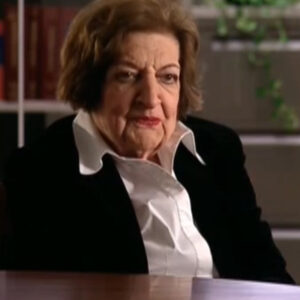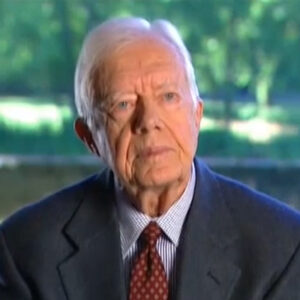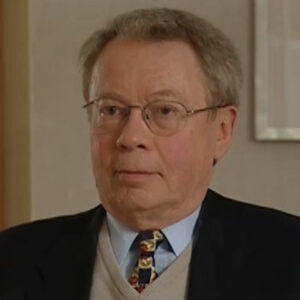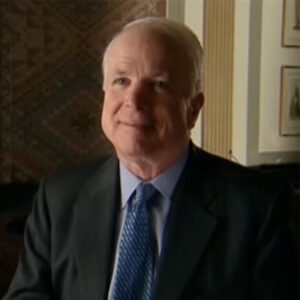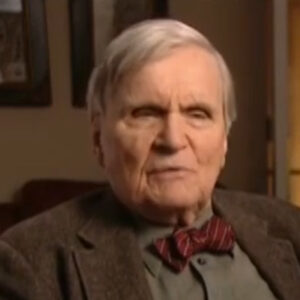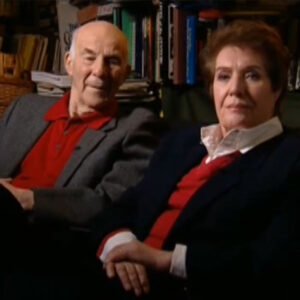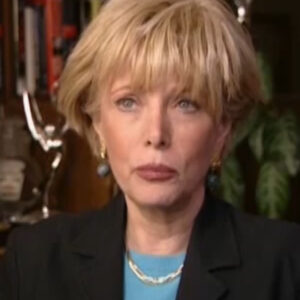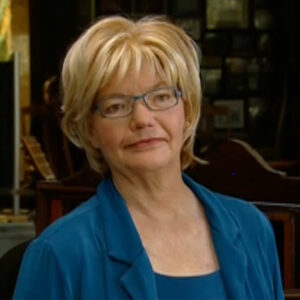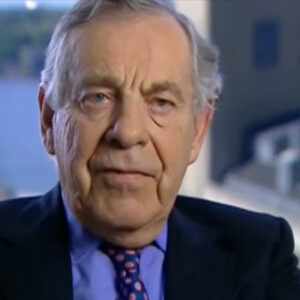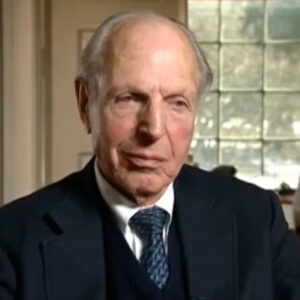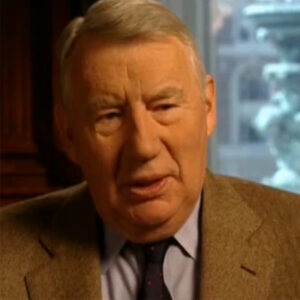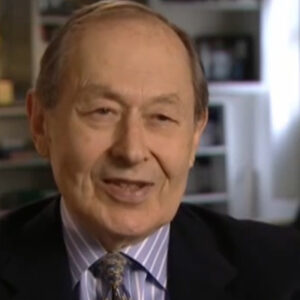Speaker I think it actually started a way back in all about junior high school days. Maybe or maybe earlier than that in grammar school days. It came in a magazine form. There were a couple of boys magazines called American Boy and something else. And they one of them did a series on various vocations, dramatized, of course. But to give young people some idea of what they might want to do in the future. And I was particularly stricken by a report about a foreign correspondent.
Speaker And I thought, that’s what I want to be as a foreign correspondent. I also saw one on being a mining engineer. Thank goodness I didn’t choose that. I would have flunked anyway because I would have flunked the engineering necessary.
Speaker I’m sure at any rate, I did. Began to think at that time of journalism.
Speaker You started working.
Speaker Yes, I did. I did indeed. A better fact.
Speaker I’m putting my question out. So are you all right? Good.
Speaker So, you know, I started writing first for a junior high school paper way back in those early grades.
Speaker We had the Purple Pump. What was the name of our newspaper for? After my junior high school. And I wrote pieces for it. And I can’t say that that really did much to further my newspaper career, but it kept me alive in the interest of it.
Speaker And when I got to high school, I was fortunate to be in a high school.
Speaker One of the few in the United States at that time that actually had courses in journalism. And it was taught by a retired city editor or one of the newspapers in Houston, Texas.
Speaker He was a inspiring man and he gripped many of us and held us to our interest in journalism right through our education, into our professional lives. I am very grateful to that gentleman because it was the turning point, the deciding point in my career.
Speaker I’m going to ask you this next question about the University of Texas.
Speaker You know, you want to take a look at. No. Yes. Well, it doesn’t fit any. Okay, tell me about your experience at the University of Texas.
Speaker Well, I was enrolled in journalism at the university.
Speaker They fortunately had a very good journalism course, which included publishing a daily newspaper for not only for the campus, but for the community as a regular, regular newspaper. And that gave us immediate thrust into the reality of having to put out a newspaper and all that was required in education and in technique. So there was a perfect place to go to for journalism.
Speaker I felt it was an I think I would still judge it as such. I worked on The Daily Texan and I had a great opportunity there to learn journalism as it was practiced not just from the classroom, but in the newsroom. It was a very valuable lesson.
Speaker As a matter of fact, it led me immediately to do active journalism. The my father wasn’t doing too well. It was in those depression years and I really needed to supplement my funding at the university.
Speaker And as such, I got a job that the state capital in covering the legislature part time, supposedly part time. However, I’m afraid that I got so fascinated and interested in that job that I began to let my schoolwork slide a bit. In fact, slide quite a lot to the point that I actually dropped out of my university training. It was a great mistake. I should not have done so. I have regretted it many times since I didn’t complete my education at the University of Texas, but completed it covering this.
Speaker The state legislature must have been an exciting time to be covering the state legislature going on there.
Speaker Well, there was, but there always is a to say the state legislatures. I think they it’s a fascinating first step, of course, in our governance.
Speaker And as such, it’s very important to understand how state legislatures work because they are a the beginning steps toward the Congress itself. And it was a very graphic education for which I was grateful. However, I did later on and have to this day regretted dropping out of college as early as I did.
Speaker OK, tell me what. Tell me about your first job or getting a job at the Yuppy and what what was it like to work for the United Press?
Speaker Or one of the great experiences of all time lows still look back upon those days and kind of think, I’d like to be working for the United Press today. Except that doesn’t exist the longer the. It was a exciting job. The Press Services, United Press and the Associated Press are servicing newspapers around the world. And as one of our writers once noted, we had a a deadline every second around the world, somewhere along the hundreds of newspapers we serve that we always are. We’re on deadline. So there was no excuse for not being on top at every minute. We had to rewrite the stories as the new information became available to a breaking story. It was exciting work, which I look back on still to this day as the highlights of my life as a journalist. I wouldn’t have traded it for anything. I am glad I knew about it. Indeed, I’d like to hate to think that I had grown up on a country newspaper somewhere, although there’s nothing wrong with that, of course, as training.
Speaker But the training I got in that deadline every minute, somewhere around the world. Was it exciting, challenging job? I don’t think any young journalist should miss.
Speaker Now, just tell me, writing that you did that. Did you find that the skills that you learned there affected the writing that you did later on in life as a journalist? My question, right.
Speaker There is no doubt that the that the training at the United Press is the deadline every second or every minute, but served very well and working in television later on. We have much the same situation in television because radio before it and the fact that we were capable of ordering up the network and putting news on the air when it was a breaking story, an assassination of the president of the United States, of course, the most outstanding example of that. But if the stories were big enough that we’re going to be the banner story in the newspapers that evening, we would break in to the educate the the the normal programming on the air. Let me take that again. Take it again. All right.
Speaker Well, the question on the question was the training that you got at the how did that affect how you wrote right in the future? Well.
Speaker That training of the United Press. That deadline, every sector or every minute certainly served. Well, when I had the opportunity to work in radio and television with CBS, there again, the we had the essence of a deadline every minute. We didn’t actually have it there, but we had the capability of moving in that direction. If a huge story broke, one worthy of breaking into the entertainment programming that time. Something as important, perhaps, as the assassination of the president of the United States. We would break into the programming and go on the air writing and reporting and broadcasting the story as we got the information into our office. It was, again, one of the really more challenging jobs we had and therefore one of the most interesting and fascinating reporting story.
Speaker How did you end up going to World War Two?
Speaker Well, I was working for the United Press and with Pearl Harbour. I wanted to get in on the action. I told them all my desires. I don’t know whether they considered my desires exactly when they made their assignments. But I was a writer on the desk in New York and they sent me down to get credentials to go on the convoys with them with what happened battleship. And that was very shortly after Pearl Harbor. And I was ordered up to get a uniform and I did that, got aboard a battleship to go to Europe. Suddenly I was in the war and it was, of course, a very exciting appearance. It’s a challenge. I didn’t know really what the job was going to be like to be reported from overseas. And the major story of that kind. But it turned out to work fairly well, I think.
Speaker Right. Now, you were the first correspondent back from the North African invasion. Can you tell me about coming back and being on the Paramount News, what it felt like to be the first cast being filmed?
Speaker Now, do you need me to set up that question again, or I just need you to just does the answer?
Speaker I need you to say I was the first correspondent from North African.
Speaker Well, I was the first correspondent back from the North African invasion, and that that gave me a little advantage, of course, in being able to get on the air and talk about the war as it was. By that time, several weeks later, it took some time to cross the ocean with a battleship. And it’s rather slow speed, the ebb and flow once back on the desk. No, never getting me getting away from the story. You want the story of the.
Speaker I just give me everything. Now, I just need to ask you another question. All right.
Speaker Tell me, what did it feel like being on that newsreel? What did it make you feel like?
Speaker Well, it made me feel like one of the Great War correspondents. And here I was, a cub practically added it. But it was it was it was it was exciting.
Speaker I use that word again, but that’s all I can say about it, was that it was exciting thing to be sitting there with all these lights on me back in my uniform as they wanted me to be and be being able to recite the highlights of the landings in North Africa.
Speaker I felt like an important war correspondent, which I was just a cub still at the age at the work, that first taste of that experience of reporting for paramount interest, maybe future. Future kind of being on the air in terms of film or television, as it finally, did you have any idea that this was going to happen to you if you’re going to use that?
Speaker Your question? You better do it again. I had something stuck stuck in my my mouth. I was getting rid of it just now.
Speaker Oh, no, no, it’s fine.
Speaker We’re not using or you’re not using that. No, no, don’t. Ask me again that I go.
Speaker You know what, I, I probably just I’m interested, but I’m probably not going to have time to use it.
Speaker So I won’t ask is this is I need you to tell me the story of the nine crying boys again. Oh yes. But as concise as you can, because it’s such a wonderful story. All right. So do you want to take a look? You remember this? I remember the story completely. The.
Speaker So we’re rolling. OK. Tell me the story of the nine crime boys.
Speaker Well, it was one of the stories that touched me very deeply. I had tears in my eyes as I wrote it, the oh, the aircraft were coming back. The bombers from a mission. And as usual, I tried to meet to one of the groups as they came in from the mission. And I had a particular group that I covered more than the others with, which I actually flew a bombing mission later. And I was at that airfield when there’s this one bomber swept the field and waited for the signal to land. And as they did, they sent out a red flare. It meant that they had a wounded aboard. And so they were cleared to land quickly. They did land this particular plane and they had fired. As I say, the red flare. So we were all wondering how much damage they had suffered and how serious the wounded were. And as they landed, they were taxiing across the field and we were able to count the number of men aboard. And I was counting them and I counted nine. There was there was not a tenth man aboard, apparently. And that was the number that flew with the mission. So one of them was missing. The plane came in.
Speaker And as it as it rolled to its stopping point on the field, I was able to count the boy and I was counting on nine of them.
Speaker It was obvious that one had been killed, apparently. And indeed, as they came up to the final landing plot, this is taking too long. Let me do a shorter version.
Speaker Well, if you want to try, go ahead. Or you could just pick up from there. And I can.
Speaker Well, I think I can make a little shorter, I think. Thank you. You said you wanted it a little shorter. Well, let me try it once more then.
Speaker What, what, what what point of life got do there?
Speaker So you realize the point you’re telling me is that you you just realize the one person who that person was missing.
Speaker All right.
Speaker I was able to see into the cockpit and I realized right away that there was the captain, the pilot himself, who was immediately not visible as they got closer. I could see that the crew, that bomber, these fellows had flown together in all this danger and suffered all of this these shootings.
Speaker They were crying. The tears were flowing down their cheeks. And it indeed was their captain who had been killed. And this sympathy they showed in a battle, a situation when they had seen so many of their colleagues on the other aircraft being killed, shot down. Lost here. They had suffered the loss of their own captain. And the the the fact that they were so gripped by this with all of the bloodshed, they had seen the loss of their captains, who was a boy their own age. Twenty two. Twenty three. Something years old. And these guys, some of them were once older, but they were all pouring down tears over the loss of their captain.
Speaker This loyalty, this friendship, this this kinship of combat. Left them in that condition when they lost their leader.
Speaker And you decided to write a story about that?
Speaker Well, so I, of course, wrote the story about it. I call it The Flying Boys. And I wondered whether what the call of I got to get boys on the flight.
Speaker Yes. You know what? Flying Fortress. You know, give me that. That’s right. Story.
Speaker Yes, of course, I wrote the story.
Speaker I’ve read flooded with this is the story of nine crying boys that of flying for.
Speaker Great. OK. Can you tell me?
Speaker OK. This is just this answer, it’s very short. This here about flying in over.
Speaker Tell me about flying with bombers over Europe.
Speaker Well, of several of us who have been covering the Air Force, were very anxious to see what it was like, not too anxious to get into the gunfire, but that’s the only way you could see what it was like. And we appealed to the Air Force to let us go when they finally did agree that we should accompany the flying fortresses or the liberators, the other heavy bombers into combat.
Speaker We did. And it was a very, I must say, exciting experience.
Speaker Now, this is going to be a you’re going to read.
Speaker What is the introduction of this? I have I put my glasses on.
Speaker Yes. Put your glasses on and then give the date. February 27, 1943. And read the dispatch.
Speaker OK. Ready? OK. Any time.
Speaker February twenty seventh, nineteen forty three American flying fortresses have just come back from an assignment.
Speaker Hell hell at twenty six thousand feet above earth, a hell of a burning tracer, bullets and bursting gun fire of crippled fortresses and burning German fighter planes, parachuting men and others not so lucky.
Speaker I have a few of these. We’ll be doing another.
Speaker Mr. Crocker, tell me about your first meeting with Meraux. What what was what was it like meeting him for you? A young journalist and what happened in World War two?
Speaker Well, I admired Murrow’s work a great deal. And when he invited me to lunch one day, I was most pleased to go to one of his clubs in London. But it turned out that it was more than just a social meeting. He offered me a job with CBS, suggested I join CBS and I. I decided that was a pretty good offer. I went back to my United Press office, however, and with all my buddies around there, which with whom I had covered the war for that point, from that point, up to that point, begging me to take it once more.
Speaker So the question is, tell me the first time you met Murrow and what was it like to meet him and what happened during World War to include that this was during the period of World War Two. All right.
Speaker Well, midpoint somewhere. World War Two. Coverage. I was invited to lunch with Edward R. Murrow, who I admire his work a great deal. And we went to one of his clubs and it turned out it was more than a social meeting.
Speaker He offered me a job with CBS and I was entranced. Well, the advantages he sketched in that I would have.
Speaker And I went back and told United Press that I was quitting.
Speaker Well, they were so touched by this, apparently, that they told me of all the advantages I would have in the future at United Press. And they made me believe it. They were all my pals from covering the war up to that point. And I had decided I couldn’t leave them. So I told the world that I was going to renege on my acceptance of his job. He didn’t take that too kindly. I must say.
Speaker OK, now here are a few more dispatch. These are two more dispatches again. I need you to. Two.
Speaker This one is these are two together.
Speaker So just the date. And then again, read this one and then the date and read that one. All right. OK.
Speaker Glasses again.
Speaker That’s.
Speaker September 18th, 1944, thousands of allied parachute ascendants, glider troops landed behind the German lines in Holland, Sundy liberated. Let me let me read this first.
Speaker Mr make much sense as Capito’s that thousands of.
Speaker September 18th, 1944, thousands of allied parachutists and glider troops landed behind the German lines in Holland Sunday. They liberated village after village from enemy troops who fled in panic before them. And as I write this, they are pushing on to their first big objective, which they expected to reach. By nightfall.
Speaker October 3rd, 1940, you just lean back a little more in your chair. Yeah. Let me do the other one.
Speaker October 3rd, 1944, the Dutch suffered more during five years of Nazi occupation than any other people of Western Europe, experienced observers believe. Today, American.
Speaker I’m sorry.
Speaker Yeah, I vote Boyzvoice is good. Not again, Shirley.
Speaker She’s made some honey. There’s some honey here. This one here has honey.
Speaker Roger, you’ll let me know when Mr. Cronkite’s voice sounded like you need a drink.
Speaker So far. Well, let’s hope hope was through that.
Speaker I could do just the second one, right?
Speaker Yeah, just a little bit.
Speaker October 3rd, 1944, the Dutch suffered more during five years of Nazi occupation than any other peoples or Western Europe, experienced observers believe. Today, American airborne troops and British armor have liberated roughly twenty five hundred square miles of the Netherlands since their invasion September 17th. And everywhere they’ve found poverty and want nothing to compare with, it has been found.
Speaker Life doesn’t read very well, but for you, is it that way, I guess.
Speaker Now, I wondered if you could start with.
Speaker You’re going to tell me about the day of liberation. What I wanted you to ask. I wanted to ask you is when you went to the office, the day of liberation.
Speaker And and basically that day of liberation, I went around to the UPI office was it had been, you know. Tell me what happened when you went to the office.
Speaker Well, it was amazing. Fascinating. I went to the address that I had. I had never been to Amsterdam before, but I went to that address that I had for where the United Press had been. It was in the basement of a bank building. And I I went to that office and they’re sitting on the steps of that building where the three members of our Dutch staff who had during the war, when the when the Germans came in to Amsterdam, they had dismantled our equivalent then of the teletype machines and had taken these parts to their own homes so that they had they met me from as they sat on the front steps of that building and they said, oh, we knew the United Press man would come and we have the parts to put together what they transmission.
Speaker So you go right back to business right now. An amazing thing. If they had been caught with those pieces of telegraph material by the Germans, they would have surely been executed.
Speaker OK. Now, this is the last two dispatches. Do you want to quickly take a look at this? And then you can read these.
Speaker This will go, but it will be very nice to have your own place as opposed to.
Speaker If you want.
Speaker Transcription because that number two, four o’clock on five. 19 six.
Speaker Did you read that one? OK.
Speaker So this is the first one and the date.
Speaker October 19th, 1944. We might as well face it, barring a political collapse. We won’t be out of the foxholes by Christmas for a month since the bold airborne assault on Holland. We have sat on this salient while we have pursued the Germans, we have chased them back to the borders of Germany. In so doing, we have shortened by one third the defensive line that they must maintain. December twenty seventh, nineteen forty four. More than half of the tanks, armored vehicles and motor transport with which the Germans roared back into Belgium 11 days ago have been destroyed by night. Air Force fighter bombers alone in 36.
Speaker I’m gonna have to start this again, there’s a period there I wanted to I don’t think you read this one.
Speaker This. You mean before? Yeah. Do you want to read through it? Just one word. Just make sure you read it.
Speaker When?
Speaker December 17th, 1944, more than half of the tanks, armored vehicles and motor transport with which the Germans roared back into Belgium 11 days ago have been destroyed by night. Air Force fighter bombers.
Speaker Let me take this one. You can pick it up from there. Good night, fighter bombers. Next.
Speaker Destroyed by third force fighter bombers alone.
Speaker Well, that’s right. Let’s just leave it there. OK, well, wait.
Speaker Let me do it again.
Speaker All right.
Speaker Let’s hope for this.
Speaker Read it again. That’s just this page memo.
Speaker Yeah.
Speaker December twenty seventh, nineteen forty four. More than half for the tanks, armored vehicles and motor transport with which the Germans roared back into Belgium just 11 days ago have been destroyed by night. Air Force fighter bombers alone in 36 hours. A perfect fly in weather today. Sixteen hundred square miles of territory overrun by Field Marshal Carl von runs. That’s counter offensive. We’re littered with burned out bulks.
Speaker Can I pick it up there?
Speaker Today, fifteen hundred square miles of territory overrun by Field Marshal Mark. The day. Fifteen hundred square miles of territory overrun by Field Marshal Carl Von runs Stets counter offensive. Were littered with burned out hulks of today. Fifteen hundred square miles of territory overrun by Field Marshal Carl von Brunn, Stets Calver offensive were littered with burned out bulk. So armor.
Speaker Books, hoax or armor tager once more.
Speaker Today, fifteen hundred square miles of territory overrun by Field Marshal Khalil one runs debts counter offensive. We’re littered with burned out hopes of armor. They were his reserves on what he had counted to turn the tide of battle. The area was rapidly taking on the same graveyard as parents of Normandy. And they waged before the in the days.
Speaker Can I pick up that last one? Yes.
Speaker The area was rapidly taking on the same graveyard of parents of Normandy in the days before the race for the German border began.
Speaker You’ve got to patch that together and patch that together. That’s fine. And then just the last.
Speaker January 5th, 1945, Mastoid may well prove to be a German Gettysburg representing the high tide of the enemy’s ability to wage offensive war in the period between D-Day and the end of hostilities. Given good weather. Lieutenant General George, as Patton’s third army could wreck the entire German plan by crashing through from the South with the help of fighter bombers.
Speaker OK. Can you do it one more time? But it’s good. What, did you do it one more time? Do you think I’ll take another sip and.
Speaker January 5th, 1945, Mastoid may well prove to be a German Gettysburg representing the high tide of the enemy’s ability to wage of war in the period between.
Speaker It’s so hard to read this in the slightest. Let me try once more.
Speaker Could I give him a little extra light, just as with that?
Speaker That’s all. That’s a big help. That’s a bit ago. It’s just you do it this way. Well, I can read it now. OK.
Speaker July 5th, 1945. Best story and may well prove to be a German Gettysburg representing the high tide of the enemy’s ability to wage a PENSEE war in the period between D-Day and the end of hostilities. Given good weather. Lieutenant General Georgette’s patterns, third army could wreck the entire German plan by crashing through the South fromUS.
Speaker They can just pick it from the Ms.
Speaker Given good weather. Lieutenant General George just Patten’s third army could wreck the entire German plan by crashing through from the South with the help of fighter bombers.
Speaker Thank you. Now we’ll go back to questions I’m sorry, OK?
Speaker Thing, your reporting of the civil rights movement.
Speaker Well, it was quite a challenge because the emotions ran high all through the country of the emotion were different for different peoples. The blacks had one solid emotion about it. Of course, the whites of motion were split among different feelings. It was a tough story to report, therefore, because in the time we had, we really couldn’t read review. Each of these positions, every time we reported a part of the story. So we had to be very careful in our wordage and in our actual statements that we did not appear to be favoring one side or the other. Although, of course, in my case, and I’m thinking an awful lot of my colleagues places, we had strong feelings of our own about it. I had a very strong feelings about the necessity to assure civil rights for all people and be certain that they that whatever we came up with stage and was the new form of our attitude toward civil rights in this country.
Speaker Now, can you just tell me a little bit about this, some of the big stories that you reported during the civil rights movement, and I wondered if you could set it up for me so I know what you’re talking about, which is one of the biggest stories of our century was the was the. To gain civil rights so we know what the subject is. So can you just tell me a little bit about some of the stories that you covered during that that were really powerful stories that you that meant a lot to you in terms of reporting? Well, the march on, you know, this, the Selma march, the assassination of Martin Luther King. Know, I don’t need I just need some some like headline.
Speaker Yeah, I’m I’m trying to remember is my problem. Yeah. Remember the name he places.
Speaker The.
Speaker Do we have footage of you covering the Selma? We have footage of you covering the assassination of Martin Luther King. We have coverage of you that with the signing Johnson signing of the first Civil Rights Act. So if you could mention that, that some of the big stories we covered during the civil rights bill were these stories.
Speaker Look, the load kids were. Killed in Birmingham. The big march on Washington. How many? And three? Three children, one in Birmingham for four was a four.
Speaker Oh.
Speaker I was going to say the assassinations of them, but that’s not the word we want. We want the murder of them, I guess. Well.
Speaker OK, so if you could introduce what we’re talking about, that we’re talking about the civil rights movement, right in your answer. OK, so tell me about reporting the civil rights movement where what were some of the key stories that you had to report on?
Speaker Well, we were reporting on all the key stories that made up the entire civil rights fight, of course. But such things as the one of the earliest ones were the shooting of the movie Children in Sunday School. Four of them in Birmingham, Alabama. Then there was the march on Selma in protest for that. Actually, there was the the the stand off at the bridge in which there was a demonstration that the police tried to stop. And in so doing, they really set up a state of war there for a few hours, which was terribly dangerous and could have gotten even more out of hand that it was all of those things. And then, of course, it all culminated in the assassination of King.
Speaker Is that was that really put put the whole thing into a kind of a package of focus that the man who was leading the fight for our civil rights and had done so much to move the flight along, should himself be assassinated in that way? Was that the absolute epitome of a tragedy?
Speaker That’s good. Now, did you have any authority was not shooting?
Speaker I was a big bomb maker. Everything was shot right after the bombing. You might wonder if that’s right. Can you just do a little pickup for me? It was the bombing of the church and church, you know.
Speaker Right. Little girl.
Speaker You know, you could just do that pickup. That would be Dale. So tell me about the incident of the bombing.
Speaker Well, there was a bombing of a church in Birmingham, Alabama. And in the in that bombing, four little girls were among the dead. Those who lost their lives there, were they the only ones that lost their lives?
Speaker I can’t remember. Yes, they were. All right. Well, make sure they fix it then. How to work? How do I pick it up? He’s going to tell me about the well church.
Speaker Well, that was really a moment that set this whole fight for the civil rights in the plane.
Speaker Take me take it again.
Speaker Well, that was the event which really set the entire civil rights fight in the framework of the war. It was the church should Birmingham was bombed and the victims of that bombing were four little girls in the Sunday school. It identified the horror of the necessity of this kind of violence before we could clean up for our rights for all people in this country and be assured that they were guaranteed those rights.
Speaker Now, how did you maintain your I mean, here you have experienced yourself living in Texas. Some of the prejudice. How did you maintain the objectivity that you are so known for during the civil rights movement? How do you keep that sort of line?
Speaker Well, that’s part of our journalism studies and in high school and college and going right through. That’s what we journalists are supposed to be able to do. Whether you’re writing it for the newspaper or whether you’re broadcasting it on the air. We are taught that you must give a balanced report. You’ve got to tell both sides of every issue you must in describing them. Use language that does not place you on one side or the other. We have to be fair, honest and correct.
Speaker OK, good. So that’s civil rights now I just wanted to go to.
Speaker What was it that you ended up deciding to sort of say one hundred and forty first day, the hundred and fifty years, and you kept every single night saying which day of the hostage crisis? Tell me a little bit about your reporting of the Iran hostage crisis and make sure that you include what we’re talking about. Thank you.
Speaker Well, they’re wrong, Heidi. They got you. The Iran hostage crisis was one of four major foreign stories during my time at the anchor desk. It was a serious story, of course. The concern was throughout the days that those peoples, the months those people were held. The concern that they might be assassinated was hanging in the wind, which would have brought us into a world war, almost certainly. I don’t see what we could have done anything except move him to Iran at that time. As such, it was a daily story. Also, it was a daily story as far as I was concerned, because I recognized a truism in my business as a journalist that it would have a way of of losing a story over a period of time when one story goes on a day after day after day. He’d take the newspaper as the as the example. The newspaper has a banner line where the first when the people for this case were seized within the next week or so, the story became a single column, a story. In another week or two, it would be in the back page of the story, the newspaper, and then eventually it would be out of the newspaper entirely while we waited with these people still locked up and imprisoned with that such as they were. I had covered enough stories to know that that transgression would happen. So therefore I was determined that we would remember those people in their imprisoned state and not let the story disappear in the back page or off of our evening news. There wasn’t anything to be said each day about it. So I decided on that little trick, if you please, over remembering them with maybe the number of days at the end of my broadcast. I want to tell you that President Carter and Mrs. Carter were not at all happy with the bike coverage. They felt that I was emphasizing the fact that the administration had failed to get them released in all that time. That was not my intention in any way. I know that President Carter was doing his best with the State Department and everybody concerned to try to get them released. So I was emphasizing the failure of the administration, but the necessity of all of us to remember that they were still locked up there and not let the story disappear from the pages.
Speaker Do you feel that in a way that the networks were focusing on doing this kind of reminding every single day? Do you think that Carter’s attempts, the government’s rescuing this disastrous rescue? Do you feel that the press had some impact in terms of that rescue?
Speaker No, I don’t think that.
Speaker I think that the State Department, our government was doing everything possible to get them freed. And every minute, every day, the State Department, the White House, we’re working on that problem. I don’t think that we had any influence in the press at all.
Speaker The last question on this is, do you feel that this, the way we handled the hostage crisis has colored the relations that we are having now with Iran? Do you feel that it’s had some impact?
Speaker I think without a question, it has an impact.
Speaker We do recognize the Iranians as enemy peoples because of what they did at that time. The right now, the concern about nuclear developments is only a. Tail on the dog, if you please. It all began with the with the hostage crisis.
Speaker Great. Do you want to take a little break? Are you all right? What about work? You came back from overseas in 1949. Can you tell me about what happened?
Speaker Well, I was still with the United Press. I’m very happy with United Press. I’m looking forward to what I thought believed to be my next assignment, which would be going back to London. As European news manager for the press service. And I was awaiting, though, hear what my next assignment would be when the I’m trying to think of just about horded.
Speaker All right. OK, Dorothy.
Speaker OK, so tell me what happened that you returned to United States and you. What happened to you in 19 when you came back from overseas in 1949?
Speaker Well, I had just served two years in Russia, as are bureau chief and only reporter in Moscow for United Press. I came back awaiting my next assignment and had some expectation that they were going to send me back to London as general news manager for Europe, which I was looking forward to. But as I was getting settled back into United Press work in Washington and enjoying that assignment very much, I hadn’t worked to Washington before the war. I got to the end of the war began, in my view, any tire of this. So, yes, let me start again.
Speaker So I think that part was that the war began.
Speaker Right. Right. Oh. But as I was working with United Press in Washington, Joy, that work very much covering capital, the war in Korea broke out and I was, of course.
Speaker Let me take it. I don’t have time to get into that. What do you want me to pick it up? I got back when I when I got back with United Press. Coming back from Russia, I was assigned to Washington, which I enjoyed very much, covering the capital. And I was doing that for United Press.
Speaker When the war in Korea broke out and I got a phone call or within a few days from Admiral Murrow and in New York and he called and he said, I don’t usually give a fellow a second chance, but in this case, I’m breaking my own rule.
Speaker Would you go to Korea for us, for CBS? And I. I thought this time I was going to take that offer and I did. I said I’d like to go to Korea with CBS. And as such, I was then put to work at the Washington Bureau of CBS awaiting my assignment when suddenly the United CBS got a license for a television station in Washington. And they.
Speaker Called me and said they were sending me to their studios. Their television studios. They’re just being established as the news man. And I said, what? I don’t know anything about television. And they said, neither do we. So you’re going to go out there and to the studio and be the news department? Well, I went out and I was the news department. I began. I started out covering local news and did it by actually, I’ve just memorized practically. Not intentionally, but just by working with the wires all day. The news all day I absorbed it and I found that I could get on the air and repeat the news of the day without a script. All I did was write the proper names on my name and numbers and I might be able to forget I wrote a little tiny print that I couldn’t possibly read today and pasted it behind the desk sign. So I would have something to fall back on. And then ad lib the news. Fifteen minutes. And it was a day I had. That was rather successful. So I waited a few days or weeks maybe and said what happened about my going to Korea? And they said, well, you’re not going to Korea and now you’re on television. And I was so upset about that that I complained violent mightily. And I even went to New York to see the president of our company and complain that I had signed up, could contract to go to Korea. And they had tipped him off that I was on the way to New York to complain. And he had my contract on his desk and he brought the contract out. And he said, Walter, I was just sort of re read this. And I don’t find anything in here that says anything about you’re going to Korea. It simply says you’re going to work for CBS. So get to work. And that was it. I never got to Korea and stayed. Instead, I was running a news department on television that nobody else was doing except. Still was in New York during that national show.
Speaker I was doing a local show for the CBS station, and that was the beginning of my television career.
Speaker Now you have another factor was that you were. You just told me that you were really family.
Speaker Well, I’m not answering that question now. I’m all of many that older. You know, I must say that that staying in New York and Washington doing this, Brooke, broke me, ticketed. I must say, the state of Washington and doing the television program as much as it p may not to get out with my friends covering the war in Korea.
Speaker I did have reason to want to stay in Washington. We had had our first child while I was on leave after the war at United Press. And she was pretty cute little girl, I must say.
Speaker She rather pretty lady today. Much later. But I didn’t feel quite so anxious to get into a war situation as I was to stay home with Betsy and the baby at that immediate moment.
Speaker I’d like to ask you a little bit about you are there. Can you tell me briefly what you are? There was. And and. And that you you used people, some of the writers were people who were on the blacklist.
Speaker Tell me a little bit about that.
Speaker One of the one of the great experiences of my time with Intellivision was the opportunity to be the anchor person for a program called You Are There. And the program had been originated as a radio program and was just being made into a television program. And the whole stage setting was that that art correspondents could see one of a shortlist selling short or.
Speaker One of the programs which I was most pleased to work with for many years was one called You are There?
Speaker And the idea it carried forth was that television could cover historical events and indeed that our correspondents would be an actual part of the show. The actors would play the part of the historical figures. But our reporters are real news reporters would interview these these people who made history in very many ways. We did everything from from ancient Rome right on up to the civil war. And they were wonderful shows. They were written by a group of writers on the West Coast who were at that time blackballed from working in television at all. And CBS were not permitted to use them. This was the time of the McCarthy episodes in Washington and the blackballing of any. That the.
Speaker Committed to be safe and.
Speaker Let’s stop. Those who were blacklisted. Right. All right.
Speaker Go camera three. The writers who wrote the scripts for these hourlong shows were blacklisted in the McCarthy era as allegedly being communist or something frightful like that. And so we weren’t permitted to use them and CBS, while our producers arranged to use them anyway and gave them false names. And by giving them these false names, they were permitted to be used. Of course, we had our producers added effect, lied to the company as to the names of the people who were writing for us. We had the best writers in Hollywood, but they were not identified by their own names at all. The man with the best writers. We had a tremendous show, a wonderful program. We had the best some of the best actors and actresses in the business. We were lucky enough to be in the early days of television and they and our show was on. On Sunday afternoon. So we were able to get the best actors and actresses who were on the Broadway stage, but were not busy because their houses were all black on Sundays. And we had this absolute all stars in our shows. The programs were just terribly successful, wonderfully successful. I just wish we’d been able to keep them on the air every read program. I close the program as the anchor man, so to speak. And I.
Speaker I said, what sort of day was it? A day like all days filled those all take it again. Can I pick it up there. I. I closed every broadcast with a little patter that went. What sort of day was it. A day like all days filled with those events that alter and illuminate our times.
Speaker And you were there and today. Oh man. On the streets in New York or any other city in the world practically. We’ll come up to me and say, what sort of day was it? They had it caught on. It was beautifully mounted. Play the. The director was Sidney Lumet, one of the great directors of our time and movies and stage and television.
Speaker And we had a prize winning broadcast, something that Sidney Lumet told me was that a lot of casting directors and TV anchor. And they decided on you. And he feels and I don’t know if you agree, but he said that because you anchored you are there. That it made people see how great an anchor you’d be for the evening.
Speaker Really? That’s true.
Speaker I kind of doubt it. I don’t know. It could be.
Speaker I don’t know. Listen, I think you should take a little break. All right. Just a little break.
Speaker Tell me when I. Right. Right. All right. So.
Speaker Let’s start with.
Speaker Yeah, right.
Speaker Rolling. Yes.
Speaker I love the evening news. Really in an intention to get a little retirement time in.
Speaker I was 65 I and I had told them all along that I intended to step down from daily journalism, not from broadcasting, but from daily journalism.
Speaker After all, I’d been fighting deadlines since I was 16 years old and I had enjoyed every minute of it. And that was my life. But now I realized I was getting a little older. My children were growing up just to the stage where I could really travel with them. And I wanted to do some of that. And you really can’t do very much traveling when you’ve got a daily broadcast. And so I had told them in advance that I was not going to renew.
Speaker When that time came and my sixty fifth birthday. Well, it so happened that just as I was getting up toward that sixty fifth birthday and the business of signing a new contract for the evening news, they had a challenge on whether they were going to put Roger Mudd or or rather into the evening news spot. And they they had to make a decision. Let me take this back. This is getting too complicated. Me do, but.
Speaker I decided to step down from the evening news as my own volition because I wanted to do some traveling with my children. I had resolved some years before that when I was 65, I was going to be with them, spend some time with them and not do daily journalism any longer. I had, after all, been doing it all my life.
Speaker I’ve had deadlines every minute since I was 16 years old, and while I enjoyed every one of those jobs, I felt it was time to get learn to know my family better. If you please. And so I had told them that I was going to quit at 65. It so happened that at that very time they were realizing that they had to do something about this question and that rather, was being lured by ABC, as my dad was in the running for the evening news job. They decided somehow, rather, to take a rather rather than minded that daily job for it. For me, it didn’t make any difference. I was going to be off the news and available, however, for other broadcast chores.
Speaker Now, tell me briefly some of the things you did after you retired from the Daily News Desk. I mean, you made documentaries, you had your on news column. Tell me a little bit about what you did after you left. The anchor desk.
Speaker Well, I did do far more of free. I left. All right. When I left the evening news desk, it turned out that I was going to be doing a lot more outside of CBS than on CBS Air. The lady did not mind my doing other things for other people. And I as long as they weren’t competing networks, actually, the idea did a lot of freelance work, has a lot of documentary material and mostly that I did. Also away from television, I did a lot of speaking, which I enjoyed very much. It was great to get out with the people and throw my ideas around for them to chew on for a for an hour or so. And. And I learned something. What was going on in our countryside. And I realized that I should have done more of that probably when I was even doing the evening news. It would have been helpful to have taken some time off and done some of those speeches around the countryside, because I learned an awful lot from the people about what was concerning them, about our current affairs, and indeed even straightening out some of the history that that was bothering them. So that was what I’ve been doing lately, mostly for the years since I stepped.
Speaker Well, quite a number of them I I’m able to be proud of many of them because they were well produced. I didn’t have as much to do with them as as the producers, perhaps, but they were all very interesting and I think very helpful educational in nearly all cases. We did one on dinosaurs, for instance, which we went right back to Africa where some of the early dinosaurs were found. And we did.
Speaker I did a series called Universe, which was a selection of different things. There was no really nothing to tie dark by a great producer. But Benjamin and I down to anything we wanted to do, it was a great of freedom to produce, as we saw an interesting educational opportunity. And we went around the world covering various aspects of the world, both political and geometric and in every sense, educational stuff.
Speaker The he did that one called Universe Situation, which was very powerful documentary on the situation.
Speaker We did indeed. I was that was one of my favorite one of mine that we could do some good, perhaps in trying to point out the failure of our war against drugs. That is still a failure. Of course, we still haven’t master it yet. But we, I think, did a lot of good with the piece we did. We went into the streets to meet the unfortunates who had been caught in this terrible habit. And we went to the experts. We went to the U. The opera, the camps where they met. We did we did some good with that one.
Speaker I’m sure the name of the documentary was. The war on drugs.
Speaker No, I can’t either tell you the truth then you did for PBS.
Speaker You do yearly this wonderful Viena you go to Vienna.
Speaker Well, yes. Yes.
Speaker Let me just say about another couple of specials that we did. I was going to mention.
Speaker Oh, I did, of course, I wasn’t it up.
Speaker I wasn’t stilled because I wasn’t doing Daily News either with the with the Tet Offensive. I will await when I was still working then forgot that.
Speaker Yes, that’s right. Do that one. Yeah. Among those specials we did. But Benjamin and I, we took John McCain, who, as you may know, was shot down as a fighter pilot in the the war in.
Speaker What through what war was it? I know I couldn’t think of the name.
Speaker It was during the Tet Offensive that he was shot.
Speaker Not that I know of. He was shot down. I can’t think of the name of the country.
Speaker No, I’m just tired. Vietnam, for God’s sake.
Speaker Just a man. You’re fine. You’re doing great. Don’t be so hard on yourself. All right. Let’s just try it again. OK?
Speaker Just say about the couple of specials one, and you don’t need to go into detail. You can just say one was on. Going back to Vietnam with John McCain. Right. And that. Well.
Speaker Well, one of our specials reserve going back to.
Speaker To be at.
Speaker Another of his special that I particularly was proud of.
Speaker We took John McCain back to the way I was stuck on this word.
Speaker Crazy. I’m getting worried about my own age right now. Let go.
Speaker One of the one of the one of the specials that I particularly like, we took John McCain back to Vietnam. He had been shot down. He was a fighter pilot. He’d been shot down and held prisoner there for a great length of time.
Speaker And it was a very interesting to see what a courageous man was faced with imprisonment and then getting out and recovering, unable to go back and look at these. This is the prison where he’d been held and tortured. We’ve made a very interesting story.
Speaker I thought he was a fine, heroic example of what our soldiers and officers went through. And it was good to get that story before the people I thought you were representative of so much that our soldiers and officers went through in that war. Very important. We did a we did a documentary on the dinosaurs. We went to Africa and went to the sites where they had been dug up in the desert, which begin with those explorers as they actually were doing their work and actually making some discoveries of the remains of all animals. It was a very interesting story and I think it was interesting to the people who watched it.
Speaker Let me let’s I think that’s fine to tell me. Now, I want to just go to another quick topic, which is can you tell me why did you go from a 15 minute news report to the 30 minute news report?
Speaker One of the great moments of my career doing the Daily News was the moment when both CBS and NBC were found, found that they were freed and could do it and may leave NBC out of that. This complicates it. One of the great moments of my years doing the evening news was when we got a half hour broadcast instead of a 15 minute broadcast, half hour itself is not adequate time to really cover this complex world of ours. And a very complicated nature nation of ours. But we we finally got the half hour and that gave us a much better broadcast that we were able to do with a minute. Fifteen minutes. When you take the advertising out of that, barely seven minutes of news copy, can you imagine with a nation as complicated as ours and a world as complicated of ours in which we believe were leaders and trying to cover all that in seven minutes, it was ridiculous that we finally had a half hour, which met twice that seven minutes anyway. It was of vastly improved service to the people.
Speaker How did you get that tagline? That’s the way it was. That was related somewhat to the 30 minute broadcast.
Speaker Well, maybe. Are you are you blaming me for taking too much time out of the 30 minute broadcast?
Speaker No, it was originally my understanding is that you said that you got within the 30 minute you could piece with a sort of small little story.
Speaker That’s right. Yeah. Right. So I just. Oh, I know. I know how to tie it in. I didn’t know what you were after. The half hour broadcast gave me time for a little more of a sign off than just good night. A shouting match practically as I got up out of the chair to leave here. This gave me time for up close. And I’d always been very fond of the United Press of a feature they had. They asked their bureaus to contribute and a little stories or one paragraph or at the most two paragraph stories where some kind of either a happy or perhaps pathetic kicker to it. And I like those little button stories. And I thought, why can’t I do that to close up the half hour broadcast? And indeed, I started doing it. But I also realized that you can’t tell a little story of that kind and just walk away. You’ve got to say goodnight somehow or other. So indeed to say goodnight. I added a little something more to say after my little little anecdote. It could be, as I said, a sad or happy. So I had to say something that would fit both of those. And what it turned out to be was. And what sort of day was it? A day like all days filled with those stories which alter and illuminate our times. That took that from six from the. Or do you. You’re there. Show. And cut it down a little bit to my evening news broadcast and end of the broadcast every night with this award trying to go to the date.
Speaker Good night.
Speaker OK. Do you mind just adding that you end up with that’s the way I mean.
Speaker That’s right. That’s what I mean. And that’s and that’s the way it is.
Speaker That’s what I said.
Speaker That’s the way it was December 3rd or something like that. The date.
Speaker Do you want me to get put a date in or just say, OK, your tagline was, you know.
Speaker So I had to have I had to finish this broadcast some way or other. And I came up with and that’s the way it was.
Speaker And I got a lot of complaints from people who didn’t agree with me.
Speaker I’d get a I’ve got I knew if there was anything a little bit controversial. And I said that’s the way it was. I’d get a bunch of mail saying, that’s not the way it was.
Speaker OK, I want to now go to the Agnew and the press during the Nixon administration.
Speaker This is just it’s very brief, but it’s important. It’s.
Speaker Well, during my broadcast years as anchor of the Evening News. Really terrible time we had was when the White House under Nixon deliberately went after the press. He was highly critical of the press. He criticized the free press as often as he had an opportunity to do, which was many times as the president of the United States. And the access to microphones all over the world. He he always would get a slap in against the press.
Speaker The so-called free press, he would say occasionally. We suffered that and I began to answer it. There came a time when we couldn’t let it alone. He was he was making a national campaign out of the freedom of the press. And the fact the freedom was not being fairly handled by the press. We had to answer that.
Speaker And we did. We began answering. And that was a good moment to be freed. Before that, we had said by the instruction of our companies, we don’t have to answer that. We just let it go. Well, he was making such a campaign out of it that they realized we had to answer and we were therefore free to answer. And when he made one of these charges, we would could come back and point out the fact that he was wrong, that we were right, which was helpful.
Speaker Now, Nixon had Agnew. So could you just give me that? Right.
Speaker You know, Agnew was his first name was Spiro Spiro Agnew.
Speaker Spiro Agnew. Spiro Agnew. All right.
Speaker Nixon made such a campaign out of that, that he actually appointed a man to pursue the press at every opportunity.
Speaker And that man was his vice president, Spiro Agnew. And he was after it in every speech he made. And he made a lot of them. He had a section that attacked the press. And it was just termin in the higher offices of CBS that we should indeed answering. At first, we were not going to answer these spurious charges, but it was decided that we had to. And I was fortunate enough to be permitted in my speeches because I did quite a few. I was permitted to answer Agnew on the issue was to issue of a free press. And what we did with it and what we did with it was give the people the truth about their government. And we had to answer them.
Speaker And it was a very interesting time, I must say, right now, if you could tell me, do you want to take another sip of water? You’re doing great. I’m going through this. Are you holding up OK? OK, good. I wanted you just to tell me briefly about the 1952 convention.
Speaker It was really the first televised convention. And what was different about that from other conventions? Sure.
Speaker She.
Speaker Our democracy began to get a very important lesson in its governance. But when we were able to take television cameras into our political conventions, I say when we were able to take them, actually simple. That was simply the truth. We were able to technically to do them, but nothing held us back. The television came in as a time when we were able to do a remote broadcast, such as covering the convention. We did the 1952 Democratic and Republican conventions. They they were a tremendous civics lesson for the American people. We saw our democracy in action. The political conventions at that time were wide open on the floor.
Speaker There, there.
Speaker Their campaign was brief for us in the no camp in the debate as to what they should campaign on. And in their selection of the presidential candidate, we took people into the inner workings of politics. And it was exciting, exciting business.
Speaker I’ve used exciting too often, perhaps in this little essay about my life as a correspondent, but there were some that were more interesting than others. And certainly this was true of the of the exciting convention. We went behind the closed doors of some of the meetings of various groups who were putting over one candidate or another as their hope of the presidential or vice presidential candidate. We were on the floor of the convention. We outfitted our correspondents with portable microphones and cameras and they could roll the floor of the convention. We were a part of the thing. Unfortunately, the the parties have quit giving us that much privilege on the floor and they have changed their entire form abroad of convention in order to hide those arguments.
Speaker They’re trying to pretend that they don’t have any arguments with their parties, which is a terrible mistake because as the conventions were shown originally, the people got involved in the argument and the debates in the fistfights that sometimes occurred on the floor of the convention that people were involved.
Speaker They’re not involved any longer, though. The parties have claimed up to the conventions and we don’t even try to go on the floor or there’s nothing to show anyway. They have agreed on what they’re going to do in secret and they go to the floor to be televised and try to make the people believe they don’t have any discussion among themselves, that they’re agreed on every little thing, an absolute lie that we show the people every four years.
Speaker OK, that’s great. If you want to take another sip of water, you’re doing great.
Speaker It just is a voice giving out. No, no, I just think my lane told me I should have you keep having a little sip because you’re holding up very well.
Speaker OK, we’re going to move to Vietnam. I just have one question, which is if you could just very briefly tell me a little bit about the process of your change in in when you reached the Tet Offensive, when you finally came out and made your statement. Tell me at the beginning of Vietnam how you what you’re sort of that you that you were very much as all the reporters were very much following the government and all that. But then you were disillusioned. By what you saw going there as particularly when you went in 65 and then you went again. I mean, you went several times to Vietnam.
Speaker All right. I just want a little brief, if you can, about how you ended up with your final statement. Oh.
Speaker You only me set the bar background of what I thought originally.
Speaker In the early days of our efforts in Vietnam, we could be proud of what we thought was going on and indeed, which I think the president of the United States, President Kennedy, thought was going on.
Speaker And that was that we could help sustain what we very much takingly believed was a democracy of sorts, a monarchy, but one a fair one, fairly run, fairly operated. We were in that defending them against the communists from the north part of their country, Viet Nam, who were coming south and trying to take over the entire country. They drove the French out of Vietnam and we came in to try to save at least some corner stone of of democracy in Southeast Asia rather than let it all go to the communists. Therefore, we had reason to be proud of the effort that President Kennedy brought forward of sending American troops to Vietnam. However, we found when we got there that I’m talking about a government finding what were they got there because they were mistaken. It turned out the monarchy there was a very cruel and dishonest one in the first place. And it was not worth saving. But we were already there. We were on the ground with our troops. So we’re entrapped in Vietnam. In trying to drive the communists out of Vietnam and restore North Vietnam to a democratic nation, which had not been but we hoped it might be in the future. Well, it turned out, of course, that as we got into that fight, even as we have been getting into Iraq today, we got in deeper and deeper and deeper to the point where you had tens of thousands of our troops being sacrificed to a useless war, really. And we we were still supporting our effort. I was saying we were supporting him, talking, speaking to the press, which I should qualify, that we were not taking sides in our broadcast, but we were reporting what was going on, which was reporting the heroism of our troops out there.
Speaker And but we were all aware that this cause would be a loss, that the communists from the north were giving us a really a tough fight. And then there came the Tet Offensive. That was one in which the North Vietnamese communists put all their forces together with deep planning, attacked our forces in what they intended to be the final fight, the final battle driving us out of Vietnam. Well, of course, it was a big story, a huge story. And I went over to cover that story. I’d been there before in Vietnam. But now we had a news story, a story as we were driven back, indicating perhaps the end of the war and unsuccessful and a defeat for us. So I wanted to see it firsthand. And when I didn’t see it firsthand, I came back and didn’t broadcast, which I. I dropped my. Impartiality and took a editorial posture and said that I felt we ought to get out of there. And apparently that broadcast had some effect. President Johnson watched it and snapped off his television set as some anger, I gather, and said, well, if I’ve lost Cronkite, I’ve lost America. If he thought that, it was not for me. At any rate. Two days later, he said he wasn’t going to run for re-election and his soon, apparently, the broadcast had some effect on the future of our country, which I’m very proud of.
Speaker I just briefly, I need you to tell me a little bit about. I have that wonderful sailing footage and I have nothing as to what what you love about sailing.
Speaker I have nothing about why you love sailing so much. Tell me why you loved one sailing. Oh, sure.
Speaker Well, if you don’t know, you don’t deserve to know right now.
Speaker Maybe you can tell the story that you picked up sailing after you had been car racing.
Speaker And all right, Joe. Well. Well, the.
Speaker You know, one of the things about my success in broadcasting, which brought a revenue far greater than I ever had with United Press and far greater I never expected to have, although it never was the multimillion dollars that others got later. I used to say that I was a Mickleham Mickey Mantle for broadcasting because he was famous for not getting those hundred those million dollar salaries until he left. And the minute he retired, I think the first million dollar salary was passed out for baseball. Well, I felt that way about broadcasting. But anyway, I finally had the money to do it, to do some some really extraordinary things, I guess. I took up automobile racing. I bought a little British sports car after the war. They were very popular over there. And I got one of mine. And I got in love with it and took up racing and did quite a lot of. Of automobile racing for a while and was very proud to say I was a pretty good one. And then then I I discovered sailing and found that that wasn’t nearly as dangerous and not nearly as costly and was a lot of fun. A real, real challenge to me. Mother Nature on on on the sea. That is the challenge of sailing. You’ve got it. You’re going to use the power there in the wind and the waves. You’ve got to be able to handle those. It’s all a challenge. But it’s not only of a it’s a challenge.
Speaker And it can one to be concerned about safety, but it is a great joy to beat Mother Nature each day out there and power your boat with the winds that she has provided and beat her at her own game with they heavy say sails as they have every time we take that again.
Speaker What do you want me to pick it up? Pick it up right there.
Speaker The challenge is that the challenge of Mother Nature was a serious one. You could get in deep trouble if you didn’t treat her well in the sense of of maintaining your boat properly and knowing how to sail it, how to get along in the waves and her winds.
Speaker And it that is what I like about sailing, is not just the joy of flying with the wind over the waters. That’s a perfect day. Those are the days you want to take your wife along the other days. You know what? She doesn’t want to go. And those are the days you really fight to make the sail a successful one.
Speaker And those are just as much fun, sometimes more fun than the more placid sailing. But all of it is worth the time and the effort.
Speaker Now, tell me, how how’s your stand there, can you do two more questions, two more questions?
Speaker OK. And then maybe we can take a little break and then there’s some voiceover. I don’t know if you have. Can you do all of that or you just. Are you enough?
Speaker Well, I don’t know. But my voice, you know, a lot of work today. I know. Well, let’s do whatever you want to do. Let’s do it.
Speaker Great. So I just wondered if you could briefly tell me about.
Speaker You’re the.
Speaker You’re reporting on Watergate. Just give me a beginning, which is that that Watergate was happening and that you decided that it was so complicated that you decided to do two these two reports that really brought the story out to the general public. Your contribution in terms of.
Speaker Well, it’s a little different story than that, but I will tell it right. The.
Speaker One of the one of the great stories of our time was Watergate scandal of Watergate and the fact that a president had to retire from office to avoid being impeached, which is why, of course, Reagan read. Watch, watch. You know what? Can I pick it up there? Pick it up. Watch what the course was. Why Nixon resigned. Going to take it again. Let me take the one thing. One of the great stories of our time was the the fact that we need.
Speaker One of the big stories of our time was the story of Watergate, which terminated a course in the president of the United States resigning rather than facing impeachment.
Speaker That story.
Speaker Now, what do we want to tell about it?
Speaker Just that that had been reported by The Washington Post. And you decided that.
Speaker All right. Well, that’s not quite the story. The.
Speaker I was very proud of. I think we were on top of the story all the way through. And it ran, as you know, for months and months and months. Well, in the years before the president walked out of a job to avoid impeachment, the the one of the great parts of that story, as far as I was concerned, was one little role that we played at CBS News and that was getting toward the election. That would be his trying to think of.
Speaker These.
Speaker He was he.
Speaker You said ever since a burglar is employed by one of Richard Nixon’s re-election campaign, committees have been caught breaking into the democratic election headquarters. The story has sporadically hit the front pages. It got particular big play in The Washington Post with Bob Woodward and Carl Bernstein when they began digging in the details.
Speaker And then and then what happened is that no one was really picking up the story in my email. Yes, it was CBS. It was. I guess they’ve decided to sort of take the facts and just I.
Speaker I know I know the story now.
Speaker But I’m trying to think it was the election was coming up. Yes. Well, is he still in office? He must’ve been.
Speaker Yes, he must have been an investor then it must have been thought that he was going to re run again. But he turned out not to. OK.
Speaker He was elected after Watergate because they were concerned with what was in the committee to re-elect the president, then went through the election and then the story actually.
Speaker Yes, that’s right. So then what happened is that the story broke out before the election, just before the election.
Speaker People were going to the polls in a few days and they the Watergate story had entirely disappeared from the newspapers. I reminded them of these two pieces.
Speaker That’s what we did. Should I tell that story right? The.
Speaker The press can role play many roles, of course. And I was proud of one that we played at CBS Evening News.
Speaker And I think helping to inform the American people in such a way that they went to the polls with intelligence to act properly in casting their ballots.
Speaker Now, maybe I’m doing too much on that. The number shorten it a bit.
Speaker One of one of the stories that I was proud of are let me do it again.
Speaker One of the stories I was proud of was one we did just before the elections in nineteen sixty five.
Speaker What you’re the. Roger, 72. No. Seven out. It was No. Seventy seven. Now, what was happening?
Speaker One of the stories I was proud of. Prof. Doug. One of the stories I was most proud of was one that we did just before election time after all of the Watergate scandal, and we were coming up to an election and the Watergate story had sort of disappeared, as they do from the newspapers and broadcast. After a period of time, they’re not repeat it all for No. Over and over again, of course. But in this case, we were the people were going to the polls and they had completely forgotten the entire Watergate scandal. And it seemed to me that they ought to be reminded of that. And so we did two long features on the evening news about the Watergate scandal and brought people up to date on where it stood at that time in the development, which will eventually lead to the president’s retirement. And we did those stories and apparently it had quite an effect on the White House here because we did the first one on a Friday and it ran over more than half of our half hour broadcast. And right before it was over, the phone was ringing. And our chairman, Mr. Paley’s office from the White House saying, what? What are you trying to do to us? This is, of course, the unfair thing that Cronkite’s ever done. You got to get rid of that guy and you got it. Not you’re not not do anymore. That broadcast that I had said, I’ll have more on Monday. And they said, you better be careful because, you know, we we appoint the lead. The people control television in this country. And and, you know, if the threats were out. So, of course, I had to call my my boss had a news call in the newsroom from Mr. Paley and others that get rid of that second story I was going to do on Monday. Couldn’t do that. Shouldn’t do that. Well, we had a strong man in Dixieland who was the president of CBS News, and he was strong enough to tell Mr. Paley that they were courageous enough. He didn’t know whether it’s strong enough or not, but is courageous enough to say we have promised the second half of that story for Monday and we’re going to put it on. He may have said, well, so we’re thinking, put it on. I’m not sure. But at any rate, we he told us what had to happen to me, what had happened that he was under this threat. But but he felt we ought to do something to placate the president, but not give up this other show. Let’s let’s shorten a little bit, because one of Palin’s complaints was we’d never done a piece that long. My B b news and the Republican Party were so are courageous. President of CBS News decided that despite the complaints from Washington, we were going ahead with the promise we made to our listeners to do a second part of the story. We did. And told and.
Speaker Well, let’s take it again.
Speaker And so our courageous news president has to supplant with his courage decided we would put on the second part of the broadcast and we did, and it was a success.
Speaker Let me let me leave that off. It shouldn’t be a success. This is why we’re in a war. Let me tell you again.
Speaker And so Dick Salaat decided that we had promised the people the second half of the story of that good election to come and we would fulfill that promise. We cut it a little bit to satisfy Mr. Paley. But on the other hand, we finished the piece. And it was a total success.
Speaker And the last question I have for you was about Spain.
Speaker You know, I’ve done it again. Success. There shouldn’t be successes of we. Let me take it again. And so with the courage of our president slant, we did put on the second half of the story and it went out as about we had planned it in the first place.
Speaker My last question is in terms of space. If you could just tell me specifically, I’m interested in the story of your coverage of Shepard’s first the first flight, that flight. Can you talk a little bit about that experience and that funny story that you tell where he said that that it was the lowest bidder? Do you remember that story was Shepard? Alan Shepard.
Speaker Oh, that was. Over beer one night, I promise never to tell it off the record.
Speaker And while he said, well, I was looking up there.
Speaker This one is falling. Sure. All it was while he sure are sorry. Yeah. OK.
Speaker Sorry. Can you just tell me about that flight? And covering that and what Wally Schwa sent you.
Speaker Well, now what flight do you want me to cover? Wally Sheraz was not the first flight, right?
Speaker I’m sorry. I’m trying to combine.
Speaker What do you want me to tell the. What is your story? Yes.
Speaker Lori, Shiraki, lead to the. Yeah, well, OK. OK. The.
Speaker It always remarkable that the courage, the bravery of those fellows who are taking the first solo flights in space in machinery, we weren’t sure we’re going to work in circumstances we were positive we could be. We’re safe. One, Cheraw wants, for instance, that I ask him after his solo flight, which was the third one. I think the second one, actually.
Speaker I I said, what were you thinking of as you sat there in that little tiny capsule about to be fired into space by these rockets?
Speaker And he said, well, Walter, he said, you know, I looked at all those instruments on the panel board that I had to hit this one and that one and twist that one and that one. And I thought to myself, good gosh, I just think this thing was built by the lowest bidder.
Speaker In terms of American culture, I mean, American society, the space program. Why was it so important? Why was the space program so important for the American people? Well, I don’t think people realize today what the Cold War and our competition in space with Russia that it was very important for our feeling about herself as a. We talked a little bit of.
Speaker Well, yes. The space program became a major contest between the United States and the Soviet Union.
Speaker And it wasn’t just a matter of of going up in space.
Speaker It was a matter of all the techniques was required. All of the engineering which was required of all the confidence that it was required at the higher levels of government to to try try try to get into space. And it wasn’t just a matter of getting into space, but we were the matter of getting there first.
Speaker The Russians, we knew, were building similar spacecraft and we did not want to appear to be any less technically cheat than they.
Speaker So it was it was it was a matter of considerable pride that we felt would run right down through the veins of the American people, that with success, we would have a confidence in our own abilities, in all sorts of science and engineering space began to represent that in general, that quality of leadership.
Speaker And so it was a race to get to space first. And we kept getting the reports from how far along we thought the Russians were, although it was a great secret, of course, and we really didn’t know, but we didn’t know that ours was the wall very far. We were mighty afraid that we were going to get beaten into space.
Speaker It was therefore of huge success, though, that although they got to space first, we were right on their heels. And we were for a moment for for that few weeks before we followed them to space.
Speaker The American people were pretty, I think, downhearted. I would say I think because I couldn’t test all of them, but certainly I was downhearted.
Speaker And I think that those like me were following the space program very closely. And that was many who were following us on the air as we reported. Our progress, which is not very much the first we were, finally were relieved to know that we had the techniques and the ability to get in space. Also, so our pride was returned to us, which was very necessary at the time.
Speaker You were very concerned about Alan flights that we weren’t quite ready. You seemed like reading some of the interviews. You seem very concerned. A lot of people were concerned about sending Alan Shepard that we were in that race and that maybe we weren’t quite as prepared.
Speaker Yes. During that race, there was a period of time when there were many of us who felt that we were rushing or attempt to beat the Russians and plan plan to member again. During that race to be the first, we we lost the race, but we were determined to get up there just as soon after their flight as we could, and as a result, many of us felt that we took undue danger in our first flight or one astronaut who is going to be aboard. It was Shepard and the flight was a.
Speaker Was a little pop.
Speaker Twelve miles or so down range. Very short, very short flight.
Speaker And I felt among others. I think that we were making a mistake rushing that flight, that we weren’t prepared. We had seen a lot of that same rocket types boy out at the pad, blowing up a few feet up and they were with a man aboard. Now we’re going to put it back aboard and take the same risks with those same type of machines. It was it was touch and go to most of our minds. I held my breath when Shepard went up and held my breath until he got safely back.
Speaker You were happy when he arrived. It must have been such a I mean, with all of that anxiety, you must have been such a celebration when he landed.
Speaker Well, it was indeed it was a great celebration at Cape Kennedy when we were at where we all knew the risks.
Speaker I’m not sure it was quite as much of a relief for the rest of the people around because we hadn’t been able to tell people what a great risk it was to to do so in advance of that flight was would be putting on the line the reputation of a lot of important scientists and engineers who had designed the flight plan, the flight, and executed the flight.
Speaker It would have condemned them if we failed. And that didn’t seem fair. Therefore, we had to. Play it down, our own concern.
Speaker Do you want to take another sip of water? We got more to do. That’s it. That’s it. The only last who asked for the title of managing editor, which was unusual for television. Tell me what that meant.
Speaker Well, managing editor on a newspaper is the editor. There are many editors of various ranks of various specialties.
Speaker But the band, who is a woman who is in law in charge of getting each newspaper out each day, each edition of it out, who makes the final assignments, who make sure that the layout is as it should be? The columns which should be occupied by each of the headlines and in turn, all parts thing. That is a managing editor and it’s a title in almost all newspapers. When I was made the anchor man for the Evening News, I wanted to make it certain that I would have control over what went into that broadcast.
Speaker And I wanted the title that would indicate that I had authority regarding what was in the broadcast.
Speaker What film were used? What stories we told. What copy we used. What we wrote. That would all be under my jurisdiction. We had other people doing it as well. But I was a managing editor and I insisted on the title and it was embarrassing because nobody else thought of it, apparently. But as soon as I demanded the title, when I became the anchor Maham, every anchor man in the country demanded from his bosses that he be called the managing editor. Most of them worked, but they had the title because they insisted on.
Speaker You did a great job. You as managing editor of the CBS News. You just picked up. You don’t need to say about newspapers, right, Joe?
Speaker Well, the managing editor was the person who let me put it another way.
Speaker The managing editor of newspapers is the person who has the final say in how the papers put together each day. I wanted that final say when I was the anchor person. It hadn’t been the policy before. As such, I became the managing editor and indeed around the country, the anchor people who did have that kind of control. I think in their shops became managing editor. It became a very popular title.

